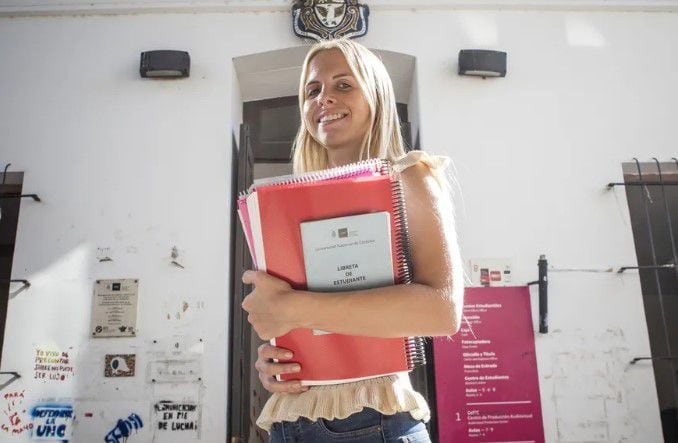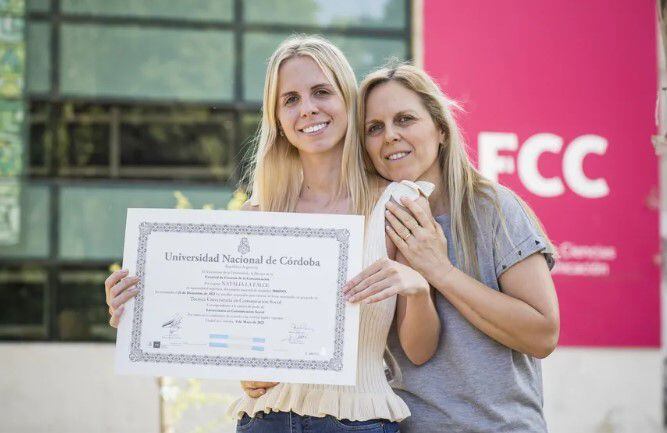This story starts on Twitter. Last Sunday, at 10:52 p.m., Natalia La Falce, a 27-year-old girl, wrote on her account on that social network: “My last 9 finals I gave up doing chemo. Today, I am 3 days away from receiving myself. This is much more than a title. It is the reward for not having given up, even when I just wanted to sleep. One step away from achieving it.”
I just needed to type it out, get it out, share it. But, as often happens in the networks, his message It had a scope that I could not imagine. accumulate almost 40 thousand likes and more than 1400 comments. “I did not expect any kind of repercussion. I uploaded it in a moment of emotion, of remembering everything that had happened to me while I was studying. I understood that he was about to achieve something that he wanted very much and to which he had put a lot of desire and effort”, says Natalia.
Look: Pipina, the 103-year-old grandmother who is a Messi fan who is ready to celebrate the Qatar 2022 World Cup
The story behind that tweet started four years earlier, when Natalie She was immersed in a violent relationship and, to that nightmare, another one was added: the diagnosis of a disease for which she would need to receive chemotherapy for six months. In this context, she assures that her faculty was what saved her: a firm board that, together with the support of her family and friends, allowed her to float amid the tidal wave.
Why do you think that 215-character tweet had such a reach? “There are many people who have gone through or are going through the same thing as me, and by understanding how difficult it is to go through such a treatment, It gives them more strength to keep going and know that it can be done.. Among so many nonsense things that are written on Twitter, a story like this surprises”reflect.
I gave up my last 9 finals doing chemo. Today, I am 3 days away from receiving myself. This is much more than a title. It is the prize for not having given up arms, even when I just wanted to sleep ✨ One step away from achieving it ✨
— Natalia La Falce (@NatiLaFalce) December 12, 2022
“The puncher hits you physically and mentally”
Natalie He grew up in General Pinto, a town in Buenos Aires where some 7,000 people live. She is the youngest of three siblings, the oldest are Francisco (31) and Luisa (28). Her mother, Marisa (52), has a clothing store. Her father, Germán (56), works in the real estate sector.
When he finished high school, he moved to Córdoba to study. First, she did Sports Journalism and then a degree in Institutional Communication at the National University of Córdoba, which is the race from which it was received this Wednesday.
In the middle of those years, from when she was 23 to when she was 24, she was in a relationship with a man who violated her in every possible way. “The batterer is a person who manipulates and hits you not only physically, but also mentally, which is even more painful. He looks for a way to make you feel weak and make you think that without him you will not be happy −stresses the journalist−. My parents wanted to get me out of that relationship, but it’s really hard to get out. The first thing people ask you is: ‘how are you going to stay there?, how do you let him hit you?’but he manipulates you so little by little that you don’t realize it”.
She left the apartment she shared with her sister to move in with her then boyfriend and, as often happens with gender violence, the spiral was in crescendo. Asking her for the password to her social networks or checking her cell phone, making her unfollow people on Instagram or derogatory comments about her body and her family were just the beginning. Then the beatings started.
“I will never forget the noise my bones made when he hit me. At that moment, all he did was cover my head, he wanted to isolate me. I was suffering and making the people who loved me suffer”, details Natalia. And she adds: “My ex took me away from my family, from my friends and from many other places, but not from what I wanted to be as a professional. The faculty was my grounding cable”.
The diagnosis that changed everything
In this context, during a medical check-up, the young woman received an unexpected diagnosis: she had a gestational trophoblastic disease, a condition that comprises a group of pathologies in which abnormal cells form inside the uterus. Within this range, the hydatidiform mole, which was what Natalia had, is the most common. In some cases, there are no complications, but in others there may be serious ones, including a rare form of cancer that requires early treatment.
“I am going to explain it to you with my words: what I had was a set of cells in the uterus that grow more and more and more and you have to remove them quickly. I could dismiss them naturally when I got sick; Otherwise, they were going to have to perform an intervention on me, ”he says. That’s how it went. A few weeks later, he underwent two operations, and since subsequent tests showed that these cells were still reproducing, he was told that he was going to need chemotherapy. “It happens to one in 7,000 people,” she explains.
The diagnosis triggered something in her that she finds difficult to put into words. The weekend that followed the news and since Sunday was Father’s Day, she told her partner that she would go to town with her family until Monday. “I grabbed my facu books, which for me were the most important thing, the computer and some clothes. I never came back, ”she says. “Now I say how crazy, if the disease hadn’t happened to me and I hadn’t left my ex, I could be dead today.” She believes that her face, perhaps, ended up on the news as one more femicide.
“I only got up to study”
In July 2020, in General Pico and accompanied by her family, started with chemo. “It lasted six months, until December, and it was through injections. They put them on me every other day. In total there were 46 and very strong. It is an invasive treatment, but the disease had to be fought, ”she describes. Every Wednesday they did blood tests (she was always accompanied by her mother, because Natalie she is terrified of needles) and on Fridays she would visit her oncologist.
The exhaustion he felt from the treatment was extreme and there were days when he could not get out of bed. “I spent six months on tea and toast because my liver was re-inflamed and I couldn’t digest anything. He had a lot of gastritis, ”he says.

In those moments of darkness, he tried not to think “why is all this happening to me”, but to stop from another place: “what can I do”. The first decision, the fundamental one, was to continue with the faculty. Since it was the time of the pandemic and everything was virtual, from the family home in General Pinto he could give it continuity. The effort, with the chemo running, was enormous. “I would just get up to study and go back to bed,” he recalls.
On the other hand, at first, when people asked her why she had ended their courtship, she would not give details. Only her family and a few people knew the hell she had been through. “Later I understood that if she told it, she could save another woman, prevent someone else from going through what I went through. So while I was doing the treatment I went to make a complaint at the police station in my town, ”she says.
She took several photos: a record of all the marks that the violent man had left on her body during that year, as well as text messages that made explicit the threats, the manipulation, the terror to which she lived exposed. “They told me that since at that moment I had no blows, the only thing they could do was put a perimeter that prohibited him from approaching me, but nothing more. That hurt me, because reporting costs a lot, ”she says.

“You can’t do it alone”
During the months of your treatment, once a week, Natalie He traveled with his mother from General Pinto to Lincoln, about 40 kilometers, to see his oncologist. Due to quarantine restrictions, they needed a special permit to circulate and had to go to the office one by one. His mother entered first and then Natalia. “They told her how the results of my tests were going and, when she left, just by seeing her I knew if they were wrong or right,” says the young woman.
the day before yesterday, when Natalie She presented her thesis and left the faculty having graduated, her family was waiting for her at the door.
−And? −asked her mother as she approached.
“I received myself,” Natalia told her, and she began to cry.
They embraced. “With that ‘so?’ of her, I remembered when he gave me the news that he didn’t have to continue with the chemo and he told me: ‘That’s it.’ Now, instead of leaving the office together, we were leaving the faculty. I cried a lot, but this time the tears were of joy”, reconstructs Natalia.

He thought of all they had gone through as a family to get to this point. In the support of his parents, siblings, friends and medical team (oncologist, nutritionist, psychiatrist and psychologist, among others). “You can’t do it alone,” she says. And in that sentence she does not speak exclusively of going through a disease like cancer, but also of gender violence.
“It is important that whoever reads this and is going through something similar understands that It is essential to ask for help. There will always be someone who will listen to you. You don’t have to wait, like I waited until I got sick. Talking on time is key, because later it may be late. A minute can change everything, because a blow can kill you”, emphasizes Natalia.
His tweet last Sunday was an unexpected explosion. Not only unknown people wrote to her, but many who had seen her grow up in the town. “I can’t believe how much I’ve grown in this time and how different I am, how changed, how maturesays Natalia. After much psychological support, in March of this year she returned to the capital Córdoba. Today she lives alone and she is looking for a job doing what she loves: journalism. Writing is her driving force, what she enjoys the most about her.
“Now I continue with routine controls. At first I had blood tests every week, then every 15 days, then every month, and now every three months. In total there are three years of treatment: I have one left, ”she says.
Regarding her future career, she details: “As it is becoming very difficult for me to get a job as a journalist, which is what I want the most, while I started with a business and sell accessories. But I always go for more. My goal is to continue studying and now I want to train as a community manager because in job searches I see that it is quite in demand”. And he concludes: “What I like is to study, learn and write.”
Source: Elcomercio
I am Jack Morton and I work in 24 News Recorder. I mostly cover world news and I have also authored 24 news recorder. I find this work highly interesting and it allows me to keep up with current events happening around the world.

:quality(75)/cloudfront-us-east-1.images.arcpublishing.com/elcomercio/V2SDM43QF5D7BDWSVHRZ4MEWFM.jpg)

:quality(75)/cloudfront-us-east-1.images.arcpublishing.com/elcomercio/6ABKCLPO2ZHDXEENFTFWWK2DLY.jpg)
:quality(75)/cloudfront-us-east-1.images.arcpublishing.com/elcomercio/BMKKVFZ2NJESRMJT7LZSH6OHW4.png)
:quality(75)/cloudfront-us-east-1.images.arcpublishing.com/elcomercio/JZMGDH5GFBBDPMYRLZLPOGGHOI.jpg)
:quality(75)/cloudfront-us-east-1.images.arcpublishing.com/elcomercio/ZDZTMJOEYFEFPEKYCPC3KHJLLI.jpg)
